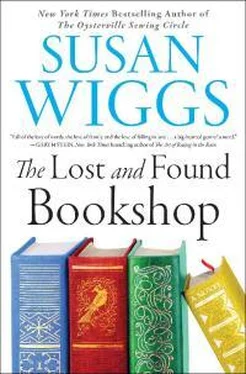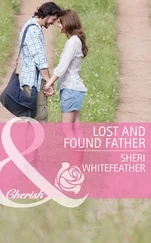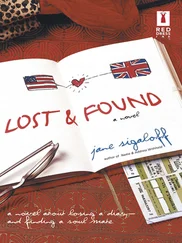He clung to memories of May’s soft singsong voice and soothing hands gently loving him in the shadowy quiet of the back bedroom. Sometimes missing her seemed like too much, like he should simply die rather than live another day without her. Then he reminded himself that there were those who never found what he and May had—poor Blythe among them. He was grateful for the years they’d had, and the ache of grief was assuaged by memories of a rare and special love. Now Blythe was gone as well, but that pain was still too fresh and sharp to soothe. His mind played tricks; he would see her face when he looked at Natalie. He’d hear her voice and imagine she was in the next room. His daughter was everywhere in this place, another reason he clung to the venerable old building despite its many flaws and failings. Just because something was old and damaged was no reason to abandon it.
Dorothy had asked him if he’d had fun getting old. He feared losing the cherished memories. If he forgot, would that mean his life had never happened at all? That it didn’t mean anything? Perhaps this was the reason his mind lingered in the past.
Blythe appeared in the doorway of his apartment. “The Larrabees are here,” she said.
Turning to her, he saw his daughter in all her radiant beauty, the large soulful eyes alight with anticipation. She was his greatest accomplishment in life—his daughter, best friend, business partner, and favorite person.
“Grandy?”
Natalie, not Blythe. His heart absorbed the hit yet again. Blythe was gone. “I’m ready,” he said.
He was grateful for Peach Gallagher, who tackled the repairs with gallantry and confidence. The renovations revealed so much more than corroded pipes and rotted timber in the walls. Andrew was quite proud of the fascinating artifacts that had been secreted away generations before. This building was a trove of hidden lives—ghosts with secrets waiting to be revealed.
She introduced him to Augusta Larrabee Jones, a woman about his age with a dramatic swirl of silver hair, bright diamond earrings, and sharp polished nails. Soigné , she would have been called back in the day. Well put together. “Augustus Larrabee was my grandfather,” she said. “My son and grandson also carry the name, but we call them Gus and Auggie to avoid confusion.”
“We’re all quite delighted to have found you,” said Andrew as they filed into the back office.
Natalie took out the medal and the original letter that had been tucked into the tin box with it. Her friend from the auction house had treated the dry, brittle paper with a spray to keep it from crumbling, and it was now encased in plastic. They took a moment to admire the find. Objects that evoked memories had a peculiar sort of power, Andrew reflected. As he and Blythe had sorted through the precious few items Colleen O’Rourke Harper had left behind, he had felt a subtle tug of connection to a stranger he’d never known. Perhaps that was what the Larrabees were feeling now.
“I can’t tell you how much this means to our family,” said Gus Larrabee. “It’s a major piece of a puzzle I’ve been putting together for years.”
“My grandfather spoke with such pride of this medal,” Augusta said, “but after the earthquake and fire, he assumed it was lost, like so much else in the city.”
“This was one of the few structures left standing,” said Andrew.
“Such stories he had,” Augusta continued. “When he was under Commodore Dewey’s command, he was blasted into the sea during a battle. Half his regiment drowned, but he and several men were rescued by native rebels—they were called Tagals back then. It didn’t sound like a good outcome, though. He was taken prisoner, and only managed to escape when the Tagals got into a skirmish with Spanish soldiers.”
“My grandfather went to fight in the Philippines as well,” said Andrew, “but he never returned and no one ever discovered what became of him.”
The woman regarded him with a gleam in her eye. “When we spoke on the phone, you said his name was Julio Harper?”
Andrew nodded, though he couldn’t remember speaking to her. “His name is on the marriage certificate left by my grandmother. Other than that, there was no other information to be found.”
“We’ve brought a few things to show you,” said Gus. “When you gave us that name, we knew there was a connection. There was a Julio Harper under Dewey’s command.”
Natalie looked at him. “Grandy, did you hear that? Julio Harper.”
Andrew nodded again. “When he was declared missing in action, Colleen applied for a widow’s pension. Yet she never received any funds. She had a letter denying the claim based on a dispute over the validity of the marriage. We never discovered the reason.”
“This might explain it.” The younger Larrabee, Auggie, placed a photograph on the table. “It’s a replica print from the San Francisco Examiner .”
Andrew leaned in, pushing his glasses against the bridge of his nose. The photograph showed a line of black soldiers standing at attention and gazing straight ahead. The caption read, Some of our brave colored boys who liberated the Philippines were among the most gallant and soldierly . . . A list of names under the photograph identified the soldiers in order.
“Look at this one, here.” Auggie indicated the man in the middle, staring from beneath a dimpled brimmed hat, white-gloved hands folded around a rifle barrel. “That’s Sergeant Julio Harper.”
“That’s your grandfather?” Natalie looked at Andrew, eyes bright with discovery.
“So it appears.” He studied the grainy photo, showing a man of color like all the others in the shot. “He was a Buffalo Soldier, then.” Andrew absorbed the information. His father’s father had been a black man. It was very puzzling.
“You never knew?” asked Natalie.
“I couldn’t have.” Could he? Was it something he’d once known? What other memories had been snatched away?
“The pension claim was probably rejected because it was an interracial marriage. It was illegal,” said Auggie Larrabee.
“Wow. Just . . . Wow.” Natalie gazed across the table at Andrew, and he saw Blythe in her thoughtful smile. “Then how did they get a certificate of marriage?”
“Another matter to puzzle out,” Andrew said. “This is simply delightful, having a photograph of my grandfather,” he added, addressing Augusta. “We’re very appreciative.”
The Larrabees left copies of the documents they’d brought, profusely thankful that they had been reunited with the medal. After learning of its value, Andrew had toyed for the briefest of moments with the notion of selling it. But there was no profit in keeping something that rightfully belonged to someone else.
As they were saying goodbye, young Auggie Larrabee asked Natalie if she’d like to go out for drinks sometime. She looked sweetly flustered, then said, “Maybe. I’m a bit busy with the shop. You know where to find me.”
After they left, she came back into the office. “Mom did one of those home DNA tests,” she said. “Did you know that?”
Andrew took off his glasses and wiped the lenses. “How’s that?”
“You send off a saliva sample and it’s analyzed to find out your genetic makeup. Mom did that test, and I found the results in her computer files.”
“Perhaps she mentioned it. I don’t recall.”
“According to the results Mom received, most of her DNA was from the British Isles. But nearly an eighth of her DNA is West African, and another sixteenth is Spanish. And there’s a small percentage of Native American as well.”
He put his glasses back on and studied the grainy photo again. “Now we know why.”
“Are you surprised? Shocked?” she asked.
Читать дальше












